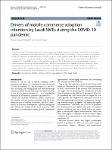Search
Author
- Amin K., Alsadi (1)
- Amparo, Urbano (1)
- Marina, Dabić (1)
- Paolo, Roffia (1)
- next >
Subject
- ERP (1)
- PLS-SEM (1)
- Vertical segregation (1)
Date issued
- 2023 (3)
Has File(s)
- true (3)
Search Results
Innovation is a general measure of the success of a company and shows a positive relationship with several key factors such as collaboration with universities and technology centers or belonging to medium- and high-tech sectors. While many studies have found that gender diversity in company management teams has a positive influence on companies’ economic success, few have focused on the impact that the inclusion of women in the board of directors has on product, process, and organizational innovation. This paper builds on previous knowledge about the determinants of innovations and shows that greater gender management team diversity, compared to male-only teams, positively affects the achievement of said innovations. |
This paper investigates the resilience of small and medium-sized enterprises (SMEs) in relation to the COVID-19 pandemic, particularly the influence exerted by certain factors related to management control, integrated information systems (enterprise resource planning [ERP]), information and communication technology (ICT) systems, and financial resources. For this purpose, leveraging from the dynamic capability theory, in late spring 2020, a questionnaire was sent to limited-liability SMEs in Verona and Vicenza provinces in Italy operating in the manufacturing, construction, and distribution sectors. Respondents were asked to answer a set of questions and to evaluate the resilience of their firms as of January 1, 2020; May 1, 2020; and one year later, as of July 2021. |
Grounded in the technology-organization-environment framework, this paper investigates critical drivers of mobile commerce (m-commerce) adoption intention by SMEs in Saudi Arabia, a developing country in transition, during the COVID-19 pandemic. A quantitative approach was adopted in this study for data collection and analysis. A proposed research model was tested and validated using PLS-SEM on data collected using a structured questionnaire from a sample of 171 Saudi SMEs located in the capital city of Riyadh. The findings reveal that top management support, environmental uncertainty and perceived benefits are the critical drivers of m-commerce adoption intention. However, perceived costs do not influence firms’ intentions to adopt m-commerce. |



